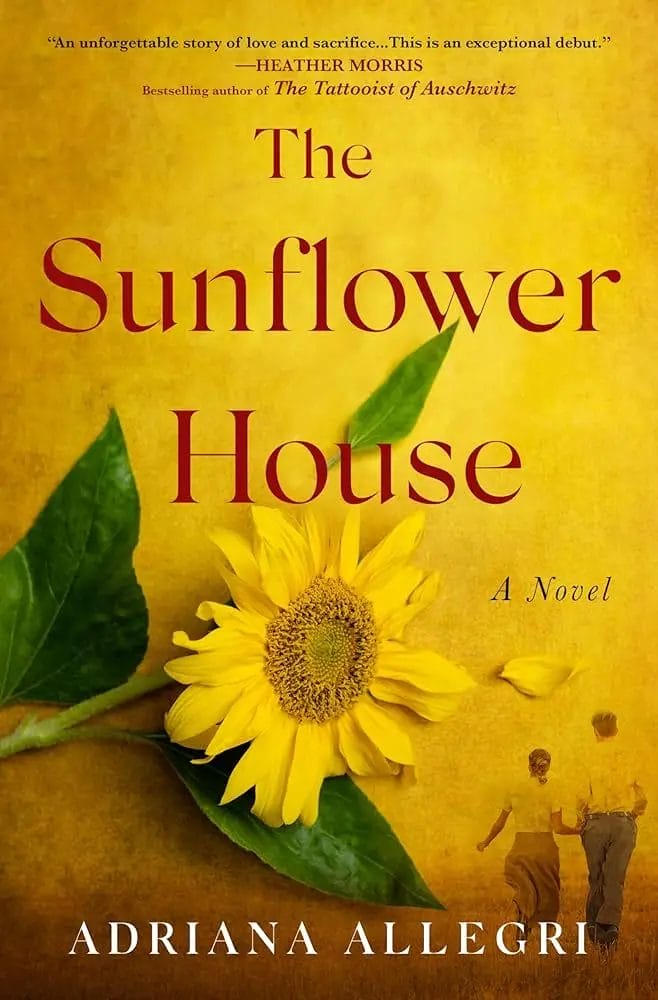

The Sunflower House
Family secrets come to light as a young woman fights to save herself, and others, in a Nazi-run baby factory—a real-life Handmaid’s Tale—during World War II.
In a sleepy German village, Allina Strauss’s life seems idyllic: she works at her uncle’s bookshop, makes strudel with her aunt, and spends weekends with her friends and fiancé. But it’s 1939, Adolf Hitler is Chancellor, and Allina’s family hides a terrifying secret—her birth mother was Jewish, making her a Mischling.
One fateful night after losing everyone she loves, Allina is forced into service as a nurse at a state-run baby factory called Hochland Home. There, she becomes both witness and participant to the horrors of Heinrich Himmler’s ruthless eugenics program.
The Sunflower House is a meticulously-researched debut historical novel that uncovers the notorious Lebensborn Program of Nazi Germany. Women of “pure” blood stayed in Lebensborn homes for the sole purpose of perpetuating the Aryan population, giving birth to thousands of babies who were adopted out to “good” Nazi families. Allina must keep her Jewish identity a secret in order to survive, but when she discovers the neglect occurring within the home, she’s determined not only to save herself, but also the children in her care.
A tale of one woman’s determination to resist and survive, The Sunflower House is also a love story. When Allina meets Karl, a high-ranking SS officer with secrets of his own, the two must decide how much they are willing to share with each other—and how much they can stand to risk as they join forces to save as many children as they can. The threads of this poignant and heartrending novel weave a tale of loss and love, friendship and betrayal, and the secrets we bury in order to save ourselves.
My thoughts:
I received an advance galley of this book courtesy of the publisher via NetGalley. All thoughts are my own.
As I was reading this novel, it dawned on me that while I don’t often read historical fiction, a lot of the books in this genre that I do read tend to focus on World War II. These books usually focus on people trying to help save Jewish people, but this book takes a different approach, highlighting an often-overlooked aspect of World War II history. While I found the book to be well-researched and, at times, heartwrenching, I also felt it was a little clunky as far as execution goes.
The story follows Allina Strauss, a young woman whose life is turned upside down when Nazi soldiers raid and then destroy her village as they try to wipe out those who don’t support Hitler. Allina is brutally attacked and then kidnapped and forced to work at a Nazi-run baby factory known as Hochland Home. This factory in the book is based on Heinrich Himmler’s Lebensborn program. In this book, young Aryan women are sent to live at Hochland Home to give birth to “genetically superior” babies who Nazi couples will then adopt.
Allina and the other nurses are not to touch the babies any more than absolutely necessary – they can basically feed them and change their diapers, and that is it. And that is only if the babies meet the “standards” of the program. If a child doesn’t measure up to specific standards, horrible things await them. Along with Karl, a troubled soldier who isn’t as brutish as the other soldiers, Allina risks everything to help the children at the home.
Allegri’s meticulous research is evident throughout the novel, as she vividly depicts the chilling realities of the Lebensborn Program and its impact on those involved. Allegri effortlessly brings to life the atrocities committed during this dark period in history, showcasing the resilience and bravery of those who resisted the oppressive regime.
Allina is strong-willed and determined. Before her village was wiped out, she learned that she is actually part Jewish, so she also has that secret to harbor, while fighting to help the children. I also really liked Karl, the troubled soldier who works alongside Allina. Their budding romance really upped the stakes and fit the story nicely. Sometimes romances feel forced in these types of books or seem to take center stage, and that wasn’t the case here, which I appreciated.
The book is really heavy and deals with some pretty awful subject matter, but I appreciated the author’s approach. I think my biggest problem was that I felt the writing was a bit clunky. Maybe it’s because I read this book directly after finishing a book that flowed exceptionally well and was almost poetic. Perhaps I was just used to a different style, and jumping into another book so quickly was too jarring. I can’t really pinpoint my issue other than it just didn’t seem to flow well, and at times, the dialogue felt inauthentic.
Overall, I found this to be a captivating read that explores an often-overlooked piece of World War II history. The story is disturbing, yet hopeful, and I really liked the characters; I just wish the writing had been a little stronger. Still, historical fiction fans will likely eat this one up.













